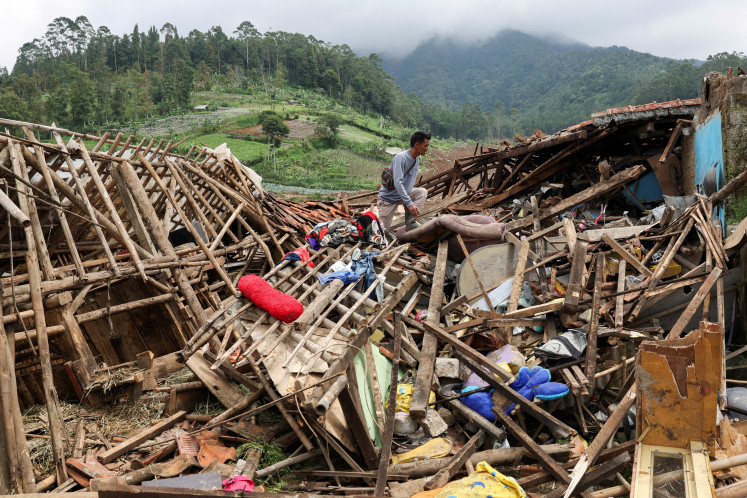Popular Reads
Top Results
Can't find what you're looking for?
View all search resultsPopular Reads
Top Results
Can't find what you're looking for?
View all search resultsExxonMobil to sell interests in Aceh gas fields and LNG plant
US-based ExxonMobil announced Monday that it intended to sell its shares in three companies associated with gas and liquefied natural gas (LNG) producing operations in Aceh – Mobil Exploration Indonesia, ExxonMobil Oil Indonesia and Mobil Indonesia LNG
Change text size
Gift Premium Articles
to Anyone
U
S-based ExxonMobil announced Monday that it intended to sell its shares in three companies associated with gas and liquefied natural gas (LNG) producing operations in Aceh – Mobil Exploration Indonesia, ExxonMobil Oil Indonesia and Mobil Indonesia LNG.
The company reported in a press statement sent to The Jakarta Post that the assets to be sold included the Arun field and the North Sumatra offshore field. According to the company’s data, as of 2010, those assets produce about 215 million standard cubic feet of gas per day (mscfd).
“The shares marketed doesn’t involve ExxonMobil’s other projects or interests in Indonesia,” read the statement.
The decision to sell the shares is consistent with the company’s long-standing practice of continuously reviewing assets for their contribution to the company’s operating and financial objectives, the statement added.
ExxonMobil has been operating in Indonesia for more than 100 years. Its current projects cover the Cepu block in Central Java, East Natuna in Riau Islands and the coal bed methane (CBM) evaluation in Kalimantan.
Last week, the firm signed an engineering, procurement and construction contract worth US$746.3 million for the Banyu Urip field at the Cepu block. The field’s maximum production capacity is estimated to hit 165,000 barrels of oil per day.
Gas in Aceh was discovered by Mobil Oil Indonesia in 1971. After studies, the government and partners then set up an LNG plant in Arun and began exporting LNG to Japan in 1978.
State oil and gas firm PT Pertamina currently holds a 55 percent stake in the Arun LNG plant. ExxonMobil owns 30 percent and a consortium of Japanese buyers owns 15 percent.
Arun, which is the oldest LNG plant in the country, saw its production peak in 1994, when the company exported 224 cargoes of gas, or 16.2 million tons. The field’s gas is expected to run out in 2014.
The plant’s 2011 output might fall 31 percent to 29 cargoes, from 38 cargoes last year, a Reuters report says. Of that amount, 26 cargoes will be sold to overseas buyers and the rest to state fertilizer producer PT Pupuk Iskandar Muda.
Pertamina had earlier announced its plan to convert the Arun LNG plant into an LNG receiving terminal in 2014. The state company claimed that it was ready invest around $80 million to materialize the plan.
Pase Energy, a regional enterprise in Aceh, has also proposed to the government to play a role in the receiving terminal project.
The receiving terminal was planned to have a total capacity of storing 100 million standard cubic feet per day (mmscfd). To fill the terminal, Pertamina said that the LNG might come from Qatar and Malaysia.
Indonesia is the third-biggest LNG exporter in the world after Qatar and Malaysia. In addition to Arun, the country has two other LNG plants: Bontang in East Kalimantan and Tangguh in West Papua.
To boost the utilization of LNG in the country, Indonesia plans to build three floating storage and re-gasification units (FSRU) in Belawan, North Sumatra, West Java and Central Java. In addition, eight mini LNG receiving terminals will also be built in the eastern region of Indonesia
The Belawan and West Java storage facilities are scheduled to begin operating in 2012, with respective capacities of 1.5 million tons per annum (mtpa) and 3.7 mtpa.










